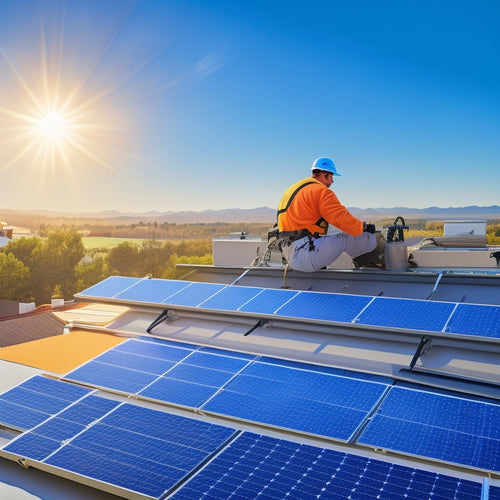
Seven Features of the Best Solar System
Share
When investing in a solar system, you want to guarantee it's equipped with the right features to maximize energy output and durability. You'll want high-efficiency solar panels with correct installation and angle to capture the most sunlight. Durable components made from high-grade materials will withstand extreme temperatures and weather. Intelligent energy storage systems and advanced inverter technology will guarantee a consistent power supply and efficient energy production. Seamless grid connection capability and real-time monitoring will optimize performance, while integration with smart home devices will streamline energy management. As you investigate these essential features, you'll uncover how they work together to deliver a superior solar system experience.
Key Takeaways
- High-efficiency solar panels with ratings above 20% maximize energy output and directly impact overall energy generation.
- Durable and long-lasting components made from high-grade materials withstand extreme temperatures and weather, reducing replacement costs.
- Intelligent energy storage systems synchronize with grid energy demands, enabling excess energy storage and consistent power supply during outages.
- Advanced inverter technology converts DC power to AC power efficiently, stabilizes power output, and extends panel lifespan.
- Real-time monitoring and performance tracking capabilities optimize solar system performance, identify issues, and enable data-driven decision-making.
High-Efficiency Solar Panels
High-efficiency solar panels are an indispensable component of an outstanding solar system, as they directly impact the amount of energy generated. You want panels with high solar panel efficiency to maximize your energy output.
Look for panels with efficiency ratings above 20%, as these will provide the most energy per hour of sunlight. When selecting high-efficiency panels, consider the installation techniques used. Proper installation is vital to guarantee peak energy production.
You'll want to verify that the panels are installed at the correct angle and direction to capture the most sunlight. Additionally, consider the type of mounting system used, as this can affect the panel's performance. A well-designed mounting system will allow for easy maintenance and adjustment.
Durable and Long-Lasting Components
When you're maximizing energy output with high-efficiency solar panels, it's equally important to verify the entire system is built to last. Durable and long-lasting components guarantee your solar system operates at its best for years to come.
You want to focus on material quality, as it directly impacts the system's overall performance and lifespan. Look for components made from high-grade materials that can withstand environmental factors like extreme temperatures and weather conditions.
Proper installation standards and maintenance practices are also essential in extending the system's lifespan. A well-maintained system reduces the risk of component failure, minimizing downtime and repairs.
Additionally, consider warranty options offered by reputable brands, as they provide added protection and peace of mind. Cost efficiency is also a key factor, as durable components may require less frequent replacements, reducing overall costs.
Aesthetic design shouldn't be overlooked, as it can enhance the system's visual appeal. Finally, research a brand's reputation to verify you're investing in a reliable and durable solar system that meets your power needs.
Intelligent Energy Storage Systems
Three key aspects of a solar system - energy generation, conversion, and storage - come together to provide a seamless power supply. When you invest in a solar system, you expect reliable and efficient energy storage. That's where intelligent energy storage systems come in. These advanced systems enhance energy storage and release, ensuring you get the most out of your solar power.
You'll benefit from smart grid integration, which enables your system to synchronize with the grid's energy demands. This means you can store excess energy during the day and feed it back into the grid when needed, reducing strain on the grid and increasing your energy independence.
A sophisticated battery management system is also essential. It monitors and controls the health and performance of your batteries, ensuring they operate within ideal parameters. This prolongs their lifespan, reduces maintenance costs, and maximizes your energy storage capacity.
With intelligent energy storage systems, you can trust that your solar system will provide a consistent and reliable power supply, even when the grid is down.
Advanced Inverter Technology Used
One essential component of a top-performing solar system is its inverter technology. You want an inverter that can efficiently convert DC power from your solar panels to AC power for your home.
Advanced inverter technology used in the best solar systems boasts high inverter efficiency, typically above 98%. This means you'll get more power from your solar panels, reducing energy waste and increasing your system's overall performance.
Advanced inverters also guarantee a longer solar panel lifespan by providing a stable and reliable power output. They're designed to handle various environmental conditions, such as high temperatures and humidity, without compromising performance.
Some advanced inverters even come with built-in monitoring capabilities, allowing you to track your system's performance in real-time. This enables you to identify potential issues early on and make adjustments to optimize your energy production.
With advanced inverter technology, you can rest confident that your solar system is running at its best, providing you with clean, reliable, and efficient power.
Seamless Grid Connection Capability
You'll want a solar system that can seamlessly connect to the grid, and that's where features like grid synchronization technology, automatic voltage regulation, and real-time monitoring capability come in.
These features guarantee that your system can efficiently feed excess energy back into the grid while maintaining a stable and safe connection.
With these capabilities, you can maximize your energy independence while minimizing any potential disruptions to the grid.
Grid Synchronization Technology
The solar system's grid synchronization technology, an essential component of seamless grid connection capability, guarantees that the inverter's output frequency and voltage are synchronized with the grid's, allowing for a smooth and efficient transfer of energy.
You can rest confident that this technology secures your solar system operates in harmony with the grid, providing a reliable source of power.
This technology is important for maintaining grid stability and efficient power management.
With grid synchronization, you can:
- Prevent energy losses due to frequency mismatches
- Maintain a stable grid connection, even during grid disturbances
- Optimize your solar system's performance and energy output
- Comply with grid connection regulations and standards, avoiding potential penalties or disconnections
Automatic Voltage Regulation
Frequently, solar systems require advanced technologies to guarantee a seamless grid connection, and automatic voltage regulation is one such vital feature.
As you investigate the benefits of solar power, you'll realize that voltage stability is essential for efficient energy production. Automatic voltage regulation guarantees that your solar system operates within the allowable voltage range, preventing damage to your equipment and assuring a reliable supply of power.
This feature is particularly important when you're feeding excess energy back into the grid. Without automatic voltage regulation, voltage fluctuations can occur, leading to grid instability and potential blackouts. By maintaining voltage stability, you can maximize the solar power benefits and secure a smooth, efficient operation.
In essence, automatic voltage regulation is a significant component of a seamless grid connection. It safeguards your equipment, maintains voltage stability, and allows you to reap the full benefits of solar power.
Real-Time Monitoring Capability
Real-time monitoring capability is an essential feature of a seamless grid connection, allowing your solar system to continuously track its performance and adjust accordingly. This feature provides you with critical observations into your system's operation, enabling you to optimize its performance and maximize energy production.
Some key benefits of real-time monitoring capability include:
-
Accurate performance metrics: Get precise data on your system's energy output, helping you identify areas for improvement.
-
User feedback: Receive alerts and notifications about system performance, allowing you to take prompt action when needed.
-
Error detection: Identify and troubleshoot issues in real-time, reducing downtime and increasing overall system reliability.
- Optimization opportunities: Use data-driven observations to fine-tune your system's performance, ensuring you're getting the most out of your solar investment.
Real-Time Energy Monitoring System
About 90% of solar system owners want to keep tabs on their energy production. You're likely no exception. A real-time energy monitoring system is essential to optimize your solar system's performance. With this feature, you can track your energy usage and production in real-time, receiving instant data analytics to make informed decisions.
You'll have mobile access to your system's performance, allowing you to monitor your energy production from anywhere. The user interface is designed to be intuitive, providing a clear and concise overview of your system's performance.
You'll receive alert notifications when your system's performance deviates from expected levels, ensuring you can take prompt action. Performance tracking and energy forecasting enable you to identify areas for improvement and optimize your energy production.
Integration options with other smart home devices and energy management systems further enhance the system's capabilities. With a real-time energy monitoring system, you'll be in complete control of your energy production, maximizing your solar system's potential and reducing your reliance on the grid.
Frequently Asked Questions
Can I Customize My Solar System to Fit My Specific Energy Needs?
You can customize your solar system to fit your specific energy needs by optimizing energy efficiency through system sizing, ensuring you generate the right amount of power to meet your unique energy requirements.
Are Solar Systems Compatible With All Roof Types and Sizes?
You'll be pleased to know that a solar system can be installed on most roof types and sizes, like the 2,000 sq. ft. asphalt shingle roof in California that accommodated a 7.2 kW system, despite its complex roof orientation and shading issues.
Do Solar Systems Require Regular Maintenance and Cleaning?
You'll need to clean your solar panels periodically to guarantee peak energy output, but maintenance frequency is relatively low, and with proper care, you can maximize solar panel longevity and enjoy uninterrupted power generation.
Can I Add More Panels to My System in the Future?
You can easily scale up your solar system for future expansion by adding more panels, but make certain they're compatible and optimize panel efficiency to maximize energy output, avoiding mismatch losses and maintaining your system's overall performance.
Are There Any Government Incentives for Installing a Solar System?
As you utilize the sun's energy, you're not alone - Uncle Sam's got your back! You'll access federal tax credits and state rebates, sweetening your solar investment; these incentives will shine bright, illuminating your path to energy independence.
Related Posts
-

Top 10 DIY Conversion Kit Reviews and Tips
You're taking the first step towards electrifying your ride, and with the right DIY conversion kit, you'll be cruisin...
-

Why Electric Motorcycles Fail at Long-Distance Touring
You're likely familiar with the excitement of hitting the open road on an electric motorcycle, but you're also smart ...
-

3 Essential Steps for Solar Electricity Installation
To guarantee a successful solar electricity installation, you'll need to follow three essential steps. First, assess ...


